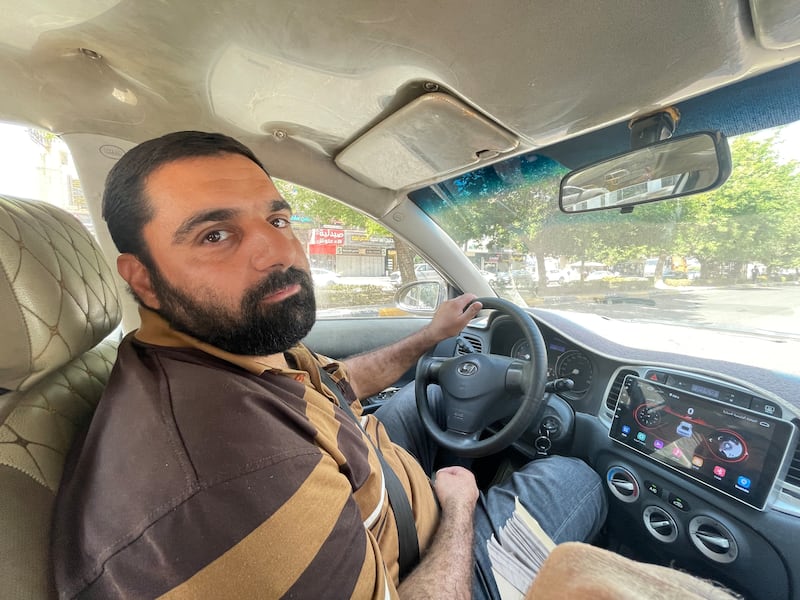Taxi drivers have long been the lifeline of urban mobility in bustling cities across the Middle East, shuttling passengers through an intricate web of streets and alleys. But today, economic hardship is threatening their livelihoods with the rising cost of living casting a long shadow over their daily routines.
As inflation rates surge and basic necessities become increasingly expensive, drivers are finding themselves caught in an unrelenting squeeze, and have begun to either reconsider their profession or work longer hours in a bid to provide for their families.
The National spoke to drivers in Baghdad, Beirut, Tunis, Cairo and Amman about the daily struggles they face.
Cairo
In the two decades that Ahmed Hassanein has worked as a taxi driver in Cairo, he has witnessed a significant change in the profession and clientele.
While years ago, he gave rides to people from all socioeconomic backgrounds, today, following the rise in popularity of ride-sharing apps, his passengers mainly belong to a specific segment of Egypt's middle class.
“A taxi’s clients today are in the middle, they are the ones who don’t want to use Uber because it is too expensive, but also have enough money to not have to suffer through the crowded public buses or the metro,” Mr Hassanein, 69, said.
The loss of customers has led many, particularly younger drivers, to seek more lucrative employment opportunities, leaving the taxi profession in a state of flux.
Egypt is currently grappling with a severe economic crisis that has left millions of its impoverished populace reeling under record-high inflation, with many unable to afford even the most basic necessities.
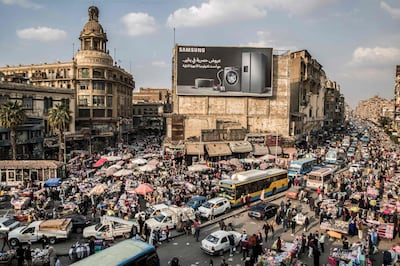
For drivers like Mr Hassanein, the price hikes have been particularly difficult. Costs of spare parts for his cab have more than doubled, raising concerns about his ability to sustain his livelihood in the event of a breakdown.
To cope with rising expenses, he has reduced his meat consumption to about once every two weeks, instead living mostly on bread, cheese, eggs and vegetables.
Fortunately, he manages to make ends meet because he has no dependents and his income is supplemented by a government pension earned from his years of service as an administrator at a state authority.
He spends his money on food, house bills and medicine for his arthritis and diabetes.
Other drivers, who have more dependents, have had to make more drastic changes to their lives, he said.
“My wife passed away about five years ago with heart disease. Both my children are married. So I supplement my pension with the money I make from driving my cab and it’s enough to cover my expenses,” he said. “But there are many drivers who have four or five young children and a wife, and God be with them with how expensive everything is right now.”
Mr Hassanein makes around 6,000 Egyptian pounds (around $200) every month but the amount tends to vary.
He has considered selling his cab and buying another car to drive for a ride-sharing app, but he cannot take on more debt at his advanced age and has accepted that he will “most likely die a taxi driver”.
Although it is more uncertain for him now, Mr Hassanein has a love for his profession and says that his income is “in God’s hands” so he does not worry about trying to find another way to make money.
“I make the money that God has intended for me on any given day. Sometimes, when I need it the most, I get a client who gives me 400 pounds for a trip that would have cost fifty. Sometimes people are generous at the most unexpected moments. I can’t see this happening if I was driving for Uber because it is more impersonal, a rider is not dealing with a human being, they are dealing with a representative of the app or the company.”
Baghdad
Once a construction worker, Wissam Mohammed Abbas, a 35-year-old resident of Baghdad, was compelled to leave his job three years ago due to the scarcity of employment opportunities and the physically demanding nature of the work.
In 2020, he bought a taxi in the hope of securing a steady income to support his wife and two children. But life as a taxi driver in Iraq's capital has proven to be far from easy. Mr Abbas faces numerous daily challenges on the city's streets, including crippling traffic, which consumes both time and fuel, as well as roads riddled with potholes that lead to frequent car breakdowns.
Behind the wheel of his 2011 Hyundai yellow taxi, Mr Abbas earns about 600,000 Iraqi dinars ($385) per month. Of this income, about 100,000 Iraqi dinars ($65) is spent on fuel and car maintenance, leaving the remainder to cover his family's needs.
“The rest can guarantee the minimum level if there are no other urgent expenses,” Mr Abbas told The National, over the sound of creaks and groans coming from his car's shock absorber. He shares a modest rented house with his brother, who works in construction, and his sister.
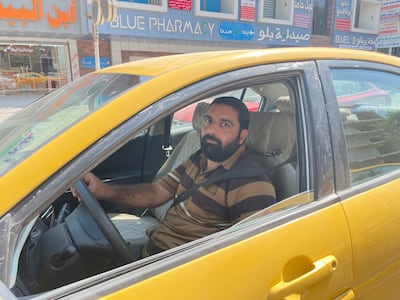
His financial struggles have been exacerbated by the depreciation of the Iraqi dinar against the US dollar – a prominent issue since late last year. The US Federal Reserve Bank's measures to restrict the flow of dollars to sanctioned countries, including Iraq, have led to a divergence between the official exchange rate (1,300 Iraqi dinars per dollar) and the black market rate (around 1,600 Iraqi dinars per dollar). This currency devaluation has led to soaring prices of essential goods.
Mr Abbas's situation is further complicated by the medical needs of his son, who was born with ureter-related issues affecting one of his kidneys. He recently borrowed two million Iraqi dinars ($1,280) to cover his son's surgery expenses, in addition to receiving two million dinars in aid from his mother-in-law.
“We've dropped many food items from our list, reduced spending money on buying new clothes or for entertainment and instead we pay only on essential things,” Mr Abbas said. “I feel the pinch mainly when buying the baby formula for my children, a one-and-a-half-year-old daughter and an eight-month-old boy.”
The family has also had to cut back on their diet, consuming red meat and chicken only once or twice a month, with no fish for the past two months.
For electricity, they rely on a private neighbourhood generator to power two air coolers, fans, and a refrigerator during the scorching summer months, saving on electricity expenses during the winter.
Beirut
Ex-police officer Ali makes less than $250 a month driving a taxi.
“I make seven to eight dollars in profit a day, on average,” he said. It’s barely enough for himself, but he also helps to support his sisters.
He began driving a taxi in 2019, when Lebanon’s economic crisis – one of the worst in the history of the modern world, according to the World Bank – caused the value of his police officer salary to plummet from the equivalent of $1,100 a month, in Lebanese pounds, to $100.
When the Lebanese economy began to dollarise, the 34-year-old thought life would stabilise. He would no longer have to worry about the fluctuation of the Lebanese currency, which this time last year was plummeting in value by the day.
Instead, Ali had new worries. The slow dollarisation of Lebanon’s economy was accompanied by an increase in taxes, from telecoms and state electricity to VAT. The cost of living soared as a result and basic goods have become unavailable to him.
“I own a cheap Chinese phone now instead of an iPhone. I cut my hair at the cheapest barbers – you know, the $4 haircut barbers,” he said. “I’m a bachelor. Before the economic crisis, I would go to restaurants, bars. I’d pay the valet to park my car. These days I don’t go out.”
Over the past year, food prices soared an annual 274 per cent while housing, water, electricity, gas and other fuels went up by 233 per cent, according to Lebanon’s Consumer Price Index.
For Ali, who has a bachelor’s degree in law, this past year has been the natural extension of a brutal phase of economic crisis facing the small Mediterranean country.
“Before 2019, I was already struggling to find an apprenticeship in a legal office so I thought to myself 'I’ll become a police officer'. And I was making decent money for a while,” he said.
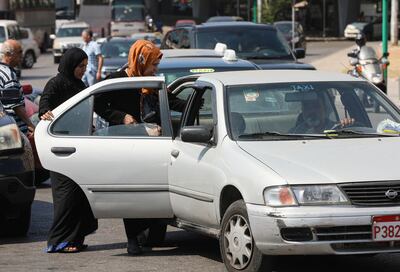
But when Lebanon’s financial crisis hit and the country’s commercial banks imposed informal capital controls, ordinary citizens – including Ali – found themselves locked out of their life’s savings.
Soon Ali found himself guarding banks against angry depositors seeking to withdraw their own money.
“I would see a woman in the bank asking for her own money and my job was to push her away and ask her to leave. And I was barely making any money while my own money was stuck in the bank,” he said. “Why would I protect the bankers instead of the people making rightful demands?”
According to him, driving a taxi is slightly better than working at a restaurant, retail store, or office for a meagre salary.
“At least I don’t have bosses standing over my head or telling me to protect bankers and politicians and thieves.”
Although Lebanon’s central bank in July loosened commercial banks’ withdrawal limits, he’s still barely able to afford his bachelor life.
“At my age … I used to think about marriage,” he told The National. “But after all my savings went I don’t think about it any more.”
Amman
Former Jordanian medic Mohammad Ibrahim has been in a financial black hole since he retired from the kingdom’s Civil Defence corps five years ago.
His entire $360 retirement salary goes towards a loan he used to build a home for him, his wife and three children in the governorate of Jerash, north of Amman.
Their only income is meagre money Mr Ibrahim makes operating a yellow taxi in Amman. He is also required to pay the bank $50 a month on top his retirement income to cover the loan payment.
“I haven’t paid that since last year,” he said.
Mr Ibrahim is one of a large proportion of Jordanians struggling to provide the basics for their family despite relatively low inflation in the country. The International Monetary Fund expects a “moderate” 2.7 per cent inflation in Jordan this year compared with 4.2 per cent last year.
But there is no recent public data on poverty in the kingdom, a sensitive political issue. The latest official figures from 2010 showed that 14.4 per cent of Jordanians lived below the poverty line, defined then as $97 a month.
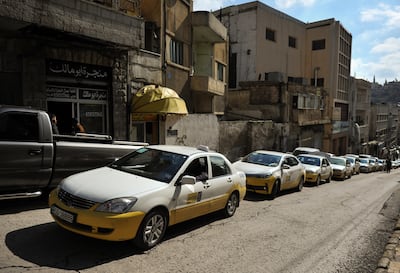
Like many cab drivers in Jordan, whether Uber or traditional taxis, Mr Ibrahim does not own the car he drives because he does not have the money to buy one.
He informally leases the taxi, a Toyota Corolla, from its owner, for $35 a day.
This leaves him with a take-home pay of $15 a day, on average, he said.
After accounting for electricity and water bills, and fuel costs for heating in the winter, Mr Ibrahim and his family can barely afford subsistence living.
“I don’t know how we do make it from one month to the next,” he said. “ Some days I come back home having made only a coupe of dinars,” he said.
Asked about whether he has seen an increase in supermarket prices this year, Mr Ibrahim says he does not pay attention because he cannot afford most of what is on the shelves.
“I think rice went up a bit. We mostly eat lentils, which have not changed much.”
He said fuel prices have dropped this year but, at $1.35 per litre, they remain sharply higher than their levels when he started work as a taxi driver two and half years ago.
“I became a taxi driver at the same time the rise in fuel made it not worth it,” he said. “If I owned my own taxi it would have been OK.”
As a last-ditch effort, just before Mr Ibrahim leaves Amman to go home at 8pm, he illegally stops at the capital’s northern exit of Sweileh to pick up potential passengers to Jerash.
“I basically become a shared service taxi, but every penny counts,” he said.
Before becoming a taxi driver, Mr Ibrahim owned a water filtering and bottling business in Jerash, which he had to sell “at a cheap price” to raise funds for a family emergency that he preferred not to disclose.
He believes that his only way out of his dead end job is to emigrate.
“Jordanians with a medic experience like mine found jobs in the Gulf caring for the elderly,” he said. “I hope the same will happen to me”.
Tunis
Mehrez Ayari spends about 12-14 hours in his car each day driving passengers across Tunis. Once an exception, these long days have become standard to scrape together enough money to make ends meet in an increasingly expensive city.
The 39-year-old taxi driver is unmarried but, between the long hours he works and the little money he makes, he struggles to imagine a future with a family.
“It is impossible for me to think about owning a house or saving for my retirement. I just work to cover my daily expenses, the car’s payments and other debt I took to also cover for my taxi,” he said during one of his night shifts.
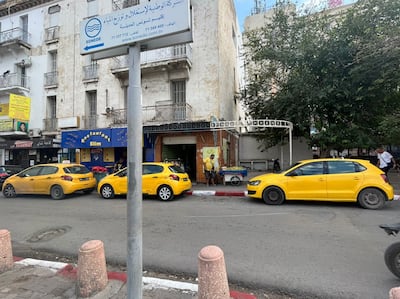
Over the past few years, Tunisians have experienced a decline in their purchasing power, making everyday life more challenging and turning basic necessities into occasional luxuries. Shortages of essential food items, including sugar, cooking oil, coffee, milk, and butter have become more frequent in recent months, exacerbated by disruptions in the global market and the war in Ukraine.
The impact is felt even more keenly due to inflation, which increased from 7.25 per cent in late 2022 to a peak of 10.4 per cent in February, according to Tunisia's Central Bank.
Tunisia's public transportation system remains underdeveloped, failing to keep pace with the growing population and workforce that rely on it. As a result, taxis have become a lifeline for many, but their rising costs place additional strain on thousands of workers and students across the country, with the state unable to provide viable alternatives.
Many of Mr Ayari's colleagues are facing similar financial challenges, especially during the back-to-school season when the cost of supplies and school necessities for their children continues to rise. Subsidised school materials have become increasingly expensive, leading many to seek second-hand options.
Even the taxi industry hasn't been spared from price increases, with the cost of essential items like tires doubling in recent years from 150 dinars ($47.15) to 300 dinars.
Mr Ayari has been working as a taxi driver since 2008, however, as the situation in his country keeps deteriorating he feels that it’s pointless to keep trying in a sector that does not give back any more.
“The stress is no longer something any human can put up with … Even our relationship with our clients becomes stressful as we keep trying to run all day to make more in a hope to make ends meet at the end of the month,” he said.
